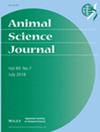Thyme Essential Oil Supplementation in Growing Merino Lambs: Effects on Growth Performance, Blood Metabolites, and Fecal Microbiology
Abstract
The study was conducted to evaluate the effect of thyme essential oil on growth performance, fecal microflora and immune system parameters in growing Merino lambs to investigate its use as safe and natural method. Thirty Merino lambs were used in 45 days in a randomized complete block design. The lambs in control group did not receive thyme essential oil, whereas each lamb in experimental groups supplemented with 250 mg thyme essential oil/d (T250) and 500 mg thyme essential oil/d (T500) throughout the study. The number of coliform bacteria was found to be the lowest in the T250 group compared to the other groups. Moreover, a significant difference was found between the control and experimental groups in the Lactobacillus (p < 0.019) and Bifidobacterium (p < 0.010) counts, and it was determined that the experimental groups contained higher numbers of beneficial bacteria than the control group. Immunoglobulin G plasma levels was highest in the 500 mg/day thyme oil group compared to the other groups. In conclusion, adding thyme essential oil with a high carvacrol content to lamb rations under stress following weaning has demonstrated that it can have antibacterial, immune-supportive, and growth-promoting properties without causing a negative effect on performance parameters.

 求助内容:
求助内容: 应助结果提醒方式:
应助结果提醒方式:


